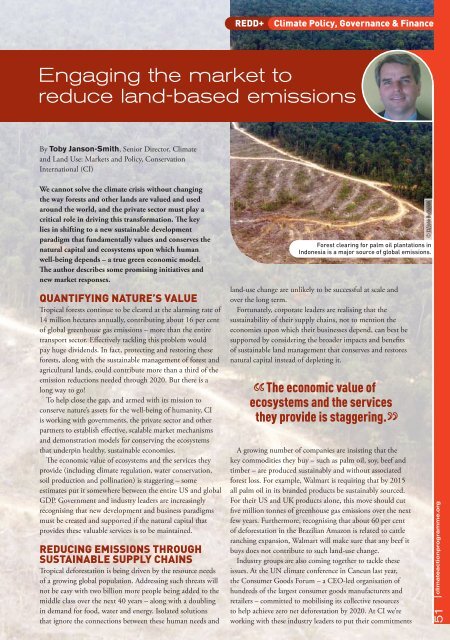Climate Action 2011-2012
Create successful ePaper yourself
Turn your PDF publications into a flip-book with our unique Google optimized e-Paper software.
edd+<br />
climate policy, governance & finance<br />
Engaging the market to<br />
reduce land-based emissions<br />
By Toby Janson-Smith, Senior Director, <strong>Climate</strong><br />
and Land Use: Markets and Policy, Conservation<br />
International (CI)<br />
We cannot solve the climate crisis without changing<br />
the way forests and other lands are valued and used<br />
around the world, and the private sector must play a<br />
critical role in driving this transformation. The key<br />
lies in shifting to a new sustainable development<br />
paradigm that fundamentally values and conserves the<br />
natural capital and ecosystems upon which human<br />
well-being depends – a true green economic model.<br />
The author describes some promising initiatives and<br />
new market responses.<br />
Quantifying nature’s value<br />
Tropical forests continue to be cleared at the alarming rate of<br />
14 million hectares annually, contributing about 16 per cent<br />
of global greenhouse gas emissions – more than the entire<br />
transport sector. Effectively tackling this problem would<br />
pay huge dividends. In fact, protecting and restoring these<br />
forests, along with the sustainable management of forest and<br />
agricultural lands, could contribute more than a third of the<br />
emission reductions needed through 2020. But there is a<br />
long way to go!<br />
To help close the gap, and armed with its mission to<br />
conserve nature’s assets for the well-being of humanity, CI<br />
is working with governments, the private sector and other<br />
partners to establish effective, scalable market mechanisms<br />
and demonstration models for conserving the ecosystems<br />
that underpin healthy, sustainable economies.<br />
The economic value of ecosystems and the services they<br />
provide (including climate regulation, water conservation,<br />
soil production and pollination) is staggering – some<br />
estimates put it somewhere between the entire US and global<br />
GDP. Government and industry leaders are increasingly<br />
recognising that new development and business paradigms<br />
must be created and supported if the natural capital that<br />
provides these valuable services is to be maintained.<br />
reducing emissions through<br />
sustainable supply chains<br />
Tropical deforestation is being driven by the resource needs<br />
of a growing global population. Addressing such threats will<br />
not be easy with two billion more people being added to the<br />
middle class over the next 40 years – along with a doubling<br />
in demand for food, water and energy. Isolated solutions<br />
that ignore the connections between these human needs and<br />
land-use change are unlikely to be successful at scale and<br />
over the long term.<br />
Fortunately, corporate leaders are realising that the<br />
sustainability of their supply chains, not to mention the<br />
economies upon which their businesses depend, can best be<br />
supported by considering the broader impacts and benefits<br />
of sustainable land management that conserves and restores<br />
natural capital instead of depleting it.<br />
The economic value of<br />
ecosystems and the services<br />
they provide is staggering.<br />
A growing number of companies are insisting that the<br />
key commodities they buy – such as palm oil, soy, beef and<br />
timber – are produced sustainably and without associated<br />
forest loss. For example, Walmart is requiring that by 2015<br />
all palm oil in its branded products be sustainably sourced.<br />
For their US and UK products alone, this move should cut<br />
five million tonnes of greenhouse gas emissions over the next<br />
few years. Furthermore, recognising that about 60 per cent<br />
of deforestation in the Brazilian Amazon is related to cattle<br />
ranching expansion, Walmart will make sure that any beef it<br />
buys does not contribute to such land-use change.<br />
Industry groups are also coming together to tackle these<br />
issues. At the UN climate conference in Cancun last year,<br />
the Consumer Goods Forum – a CEO-led organisation of<br />
hundreds of the largest consumer goods manufacturers and<br />
retailers – committed to mobilising its collective resources<br />
to help achieve zero net deforestation by 2020. At CI we’re<br />
working with these industry leaders to put their commitments<br />
© CI/John Buchanan<br />
Forest clearing for palm oil plantations in<br />
Indonesia is a major source of global emissions.<br />
51 climateactionprogramme.org












